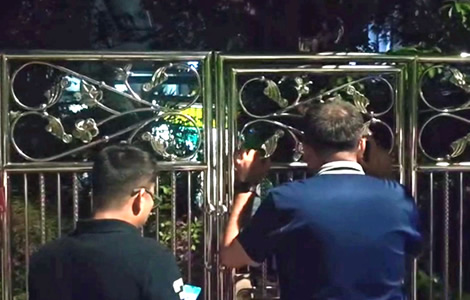An 83-year-old Bangkok woman chased real police from her gate while talking to a fake officer on the phone, then transferred money to the scammer. Her shocking case exposes Thailand’s deepening online fraud crisis, driven by gangs from Cambodia and Southeast Asia.
An 83-year-old woman has become the face of Thailand’s deepening online fraud crisis after blindly handing over more money to a scammer, while real police stood helplessly outside her gate. Despite urgent warnings from bank officials, cybercrime units, and local officers, she ignored them all, choosing instead to trust a fake policeman on the phone. On Saturday night, as officers pleaded with her not to send the money, she dismissed them and completed the transfer. Later, when she found out, the damage was done. She filed a complaint with Phra Khanong Police, but her money was already gone—just another victim in a growing scam empire operated from across the border in Cambodia.

An 83-year-old woman in Bangkok has become the latest symbol of Thailand’s spiralling online fraud crisis. The incident, bizarre yet deeply troubling, unfolded in Phra Khanong, an upscale residential district of the capital. Despite repeated warnings, the elderly woman fell victim to a call centre scam that ultimately cost her close to ฿5 million.
Police say the woman, who lived alone, believed she was cooperating with a senior officer in a criminal investigation. In truth, the voice on the phone belonged to a scammer operating from abroad. Over ten days in early September, she drained her savings across five separate transfers, each more desperate than the last.
Real police watched helplessly as elderly Bangkok woman completed transfers to scammer on the phone
Initially, on September 3, she handed over ฿3.5 million. The next day, she sent an additional ฿400,000. Further transfers of ฿300,000, another ฿300,000, and finally ฿450,000. Each time, the scammer urged her forward with the promise of safety and legal protection. Altogether, she lost nearly ฿5 million.
However, the fraud didn’t end there. On Saturday, September 13, local officers, alerted by suspicious banking activity, arrived at her home to intervene. But instead of being relieved, the woman turned them away and sent another payment. She was convinced the real police were impostors. Worse, she phoned her scammer mid-visit to report that “fake officers” were harassing her.
Although authorities pleaded with her to stop transferring money, she refused. Officers could do little but retreat and ask community leaders to monitor her. Only hours later, when her funds and online friend disappeared, did she realise she had been duped.
Eventually, she filed a report. Fortunately, police—working with the Online Crime Operations Centre (AOC 1441)—managed to freeze ฿2.5 million of the funds before they disappeared overseas. According to Police Colonel Phumiyot Lekkla, Deputy Commander of Metropolitan Police Division 5, the bank had flagged the unusual withdrawals, triggering the police response.
This story may sound absurd, but sadly, it is far from unique. Instead, it represents just one case in a nationwide epidemic of scams targeting Thai citizens, especially the elderly and wealthy. And while the scammers are online, their operations are grounded in real-world criminal infrastructure across Southeast Asia.
Surge in transnational scams linked to criminal hubs in Cambodia, Myanmar, Laos and regional networks
In recent weeks, online fraud targeting Thailand has surged at unprecedented levels. Criminal gangs based in Myanmar, Laos, and especially Cambodia are behind a majority of these call centre operations. This is not speculation. It is confirmed by police agencies and in recent United Nations reports.
In June, the UN Office on Drugs and Crime labelled Cambodia the global hub of illicit scamming activities. Its sprawling networks run with impunity across the region, luring in thousands of victims monthly. The criminals are highly organised, well-financed, and increasingly aggressive in their tactics.
Moreover, Cambodian operations have reached such levels of brazenness that they are now influencing regional politics. Some analysts suggest that a recently leaked audio tape, released by former Cambodian leader Hun Sen, was a calculated move. The tape embarrassed Thailand’s Pheu Thai-led government and surfaced during ongoing diplomatic tensions.
In fact, these scams are now considered a key factor behind the Thai-Cambodian border dispute. That dispute recently led to the full closure of border crossings. Although the Royal Thai Army shut down crossings in early 2025 and even cut power to parts of Cambodia, the fraud has again escalated in the last few weeks.
Thai military demands crackdown on 60 scam centres in Cambodia as diplomatic pressure continues to rise
Meanwhile, talks between the two countries remain tense. Thai authorities have demanded that Cambodia shut down at least 60 scam centres operating within its territory. So far, however, there has been little concrete progress. The interim Thai government and army say the border will remain closed until there is real action.
Still, this border crackdown has done little to stop the flood of money pouring out of Thailand. The AOC 1441 centre is now overwhelmed. Its agents report thousands of new fraud cases every day. Often, these cases involve large sums and high-profile victims. Increasingly, even ordinary account holders are being caught in the web.
That’s because once “hot money” enters the banking system, it taints everything it touches. Innocent people who sell goods or services to scam-linked buyers may suddenly find their accounts frozen. Some are interrogated. Others lose access to their funds entirely. For many, the shock comes with no warning.
In one case, a teenager was arrested after unknowingly letting scammers use his bank account. He had been offered a fee to “hold money.” He later found himself accused of laundering over ฿10 million.
Innocent Thais caught in fraud dragnet as ‘hot money’ taints accounts and sparks nationwide panic
Thailand’s financial system is now under stress. Legitimate businesses fear accepting payments from new customers. Banks are being pressured to monitor transactions more closely. Yet with scams spreading so rapidly, stopping the flow seems nearly impossible.
The technological sophistication of the scam gangs is also increasing. Many now impersonate government agencies or even police departments. Some claim to be calling from Laem Chabang Police Station. Victims are threatened with arrest if they do not comply. Fear and confusion do the rest.
Meanwhile, frustration is mounting. People are angry—not just at the scammers, but also at the system. They feel let down by the police, by the banks, and by the government. Many say more needs to be done.
Colonel Phumiyot believes AOC 1441 is a powerful tool, but even it has limits. It helps flag suspicious behaviour and allows for faster police responses. However, it cannot undo the damage once the money is gone.
Scammers now impersonating police as fake threats and arrests fuel panic among confused victims
In the Phra Khanong case, the centre’s early alert likely saved the elderly woman from losing everything. But even so, she remains emotionally devastated and financially shaken. Her trust in institutions has been shattered.
Ultimately, her story highlights a deeper truth. Thailand is not simply facing a wave of online crime. It is dealing with a systematic assault on its digital infrastructure and its citizens’ trust. And unless the networks behind these scams are dismantled at the source, more lives—and fortunes—will be destroyed.
Financial system chaos for traders and honest people as top security agencies pursue new banking powers
Debt and ฿1.7 million loss to scammers drive man to murder his wife and two sons in Samut Prakan
70 year old Udon Thani man played like a fiddle by Chinese sex doll scammers, drops police report plan
For now, the Royal Thai Army and interim government insist the pressure on Cambodia will continue. But without coordinated international action, including from regional powers and UN agencies, Thailand’s war against online scams will remain an uphill battle.
And as long as desperate grandmothers, trusting businessmen and careless teenagers keep falling for the lies, the scammers will keep winning.
Join the Thai News forum, follow Thai Examiner on Facebook here
Receive all our stories as they come out on Telegram here
Follow Thai Examiner here
Further reading:
Banking crisis as security overreach limits large numbers of personal and business bank accounts
Korean Goldfinger’s warm welcome by Technology and Crime Suppression police at Suvarnabhumi
Tourism cryptocurrency sandbox payment plan is bound to face stiff opposition from the central bank
Thaksin calls for crypto-based bonds. Notes success and beauty of Isan women who marry foreigners
Future Bank of Thailand Chairman Pick warns that the Thai economy faces ‘disaster’ without rate cuts


















